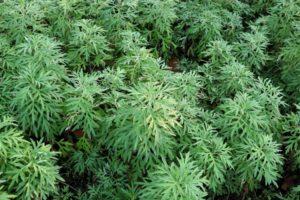Artemisinin is the active medicinal ingredient isolated from the Artemisia Annua plant. This plant, which is better known as sweet wormwood has been used in Asia for medical treatment for thousands of years. The Chinese name for this herb is Qinghao.
Recently, Artemisinin for cancer treatment has been under early research and testing for treatment of cancer, primarily by researchers at the University of Washington. According to their studies, Artemisinin is cytotoxic to 55 different types of cancers, most notably leuemia, breast cancer, colon cancer, prostate cancer, lung cancer, and fibrosarcomas.

It is believed that the anti-cancer properties of Artemisinin for cancer treatment are due to it having a peroxide lactone group in its structure. It seems that when the peroxide comes into contact with high iron concentrations (common in cancerous cells), the molecule becomes unstable and releases reactive oxygen species. It has been shown to reduce angiogenesis and the expression of vascular endothelial growth factors in some tissue cultures. In studies, it was also shown that Artemisinin was able to destroy tumors that were previously resistant to chemotherapy.
Artemisinin For Cancer Treatment
At Sunridge Medical, our highly-trained physicians are experts in providing an integrated approach to the mechanisms of action in the treatment of cancer and chronic disease. Our treatment plans are individualized and involve both traditional and alternative medicines. The physicians at Sunridge Medical have found that symptoms frequently can be improved and even reversed with our natural treatments. We take a holistic approach to patient care and strive to not only treat the disease, but also alleviate symptoms, increase the quality of life and, most importantly, address the underlying cause of disease.
References on Artemisinin For Cancer
Read more about Artemisinin for Cancer Treatment in the alternative cancer research information.
Artemisinin as a Novel Anti-Cancer Therapy
Augustin Y, Staines HM, Krishna S. Artemisinins as a novel anti-cancer therapy: Targeting a global cancer pandemic through drug repurposing. Pharmacol Ther. 2020 Dec;216:107706. doi: 10.1016/j.pharmthera.2020.107706. Epub 2020 Oct 16. PMID: 33075360; PMCID: PMC7564301. https://www.ncbi.nlm.nih.gov/pmc/articles/PMC7564301/ Artemisinins are a unique class of antimalarial drugs with significant potential for drug repurposing for a wide range of diseases including cancer. Cancer is a leading cause of death globally and the majority of cancer-related deaths occur in Low and Middle Income Countries (LMICs) where conventional treatment options are often limited by financial cost.
Drug repurposing can significantly shorten new therapeutic discovery pathways, ensuring greater accessibility and affordability globally. Artemisinins have an excellent safety and tolerability profile as well as being affordable for deployment in Low and Middle Class Income Countries at around USD1 per daily dose. Robust, well-designed clinical trials of artemisinin drug repurposing are indicated for a variety of different cancers and treatment settings.
Artemisinin Mediates Its Tumor-Suppressive Activity
Anticancer Effect of AntiMalarial Artemisinin Compounds
The anti-malarial drug artemisinin has shown anticancer activity in vitro and animal experiments, but experience in human cancer is scarce. However, the ability of artemisinins to kill cancer cells through a variety of molecular mechanisms has been explored. A PubMed search of about 127 papers on the anti-cancer effects of antimalarials has revealed that this class of drug, including other antimalarials, have several biological characteristics that include anticancer properties.
Experimental evidence suggests that artemisinin cancer compounds may be a therapeutic alternative in highly aggressive cancers with rapid dissemination, without developing drug resistance. They also exhibit synergism with other anticancer drugs with no increased toxicity toward normal cells. It has been found that semisynthetic artemisinin derivatives have much higher antitumor activity than their monomeric counterparts via mechanisms like apoptosis, arrest of cell cycle at G0/G1, and oxidative stress.
The exact mechanism of activation and molecular basis of these anticancer effects are not fully elucidated. Artemisinins seem to regulate key factors such as nuclear factor-kappa B, survivin, NOXA, hypoxia-inducible factor-1α, and BMI-1, involving multiple pathways that may affect drug response, drug interactions, drug resistance, and associated parameters in normal cells.
Newer synthetic artemisinins have been developed showing substantial antineoplastic activity, but there is still limited information regarding the mode of action of these synthetic compounds. In view of the emerging data, specific interactions with established chemotherapy need to be further investigated in different cancer cells and their phenotypes and validated further using different semisynthetic and synthetic artemisinin derivatives.
Artemisinin and Cancer Therapy
Artemisia annua L. is used throughout Asia and Africa as tea and press juice to treat malaria and related symptoms (fever, chills). Its active ingredient, artemisinin (ARS), has been developed as an antimalarial drug and is used worldwide. Interestingly, the bioactivity is not restricted to malaria treatment. We and others found that ARS-type drugs also reveal anticancer in vitro and in vivo. In this review, we give a systematic overview of the literature published over the past two decades until the end of 2016. Like other natural products, ARS acts in a multi-specific manner against tumors. The cellular response of ARS and its derivatives (dihydroartemisinin, artesunate, artemether, arteether) towards cancer cells include oxidative stress response by reactive oxygen species and nitric oxide, DNA damage and repair (base excision repair, homologous recombination, non-homologous end-joining), various cell death modes (apoptosis, autophagy, ferroptosis, necrosis, necroptosis, oncosis), inhibition of angiogenesis and tumor-related signal transduction pathways (e.g. Wnt/β-catenin pathway, AMPK pathway, metastatic pathways, and others) and signal transducers (NF-κB, MYC/MAX, AP-1, CREBP, mTOR etc). ARS-type drugs are at the stairways to the clinics. Several published case reports and pilot phase I/II trials indicate clinical anticancer activity of these compounds. Because of unexpected cases of hepatotoxicity, combinations of ARS-type drugs with complementary and alternative medicines are not recommended, until controlled clinical trials will prove the safety of non-approved combination treatments.
For answers or to make an appointment, call us toll-free at
800-923-7878
Recover your vitality, reclaim your energy and rediscover your health.



